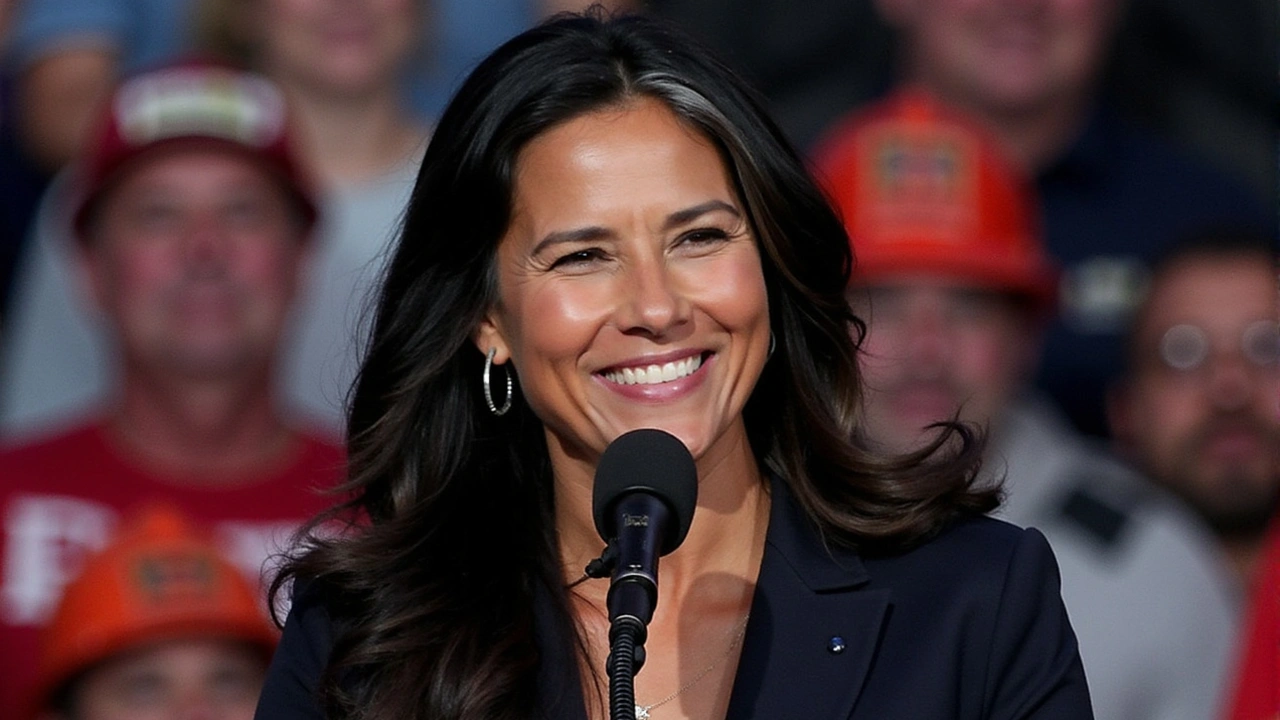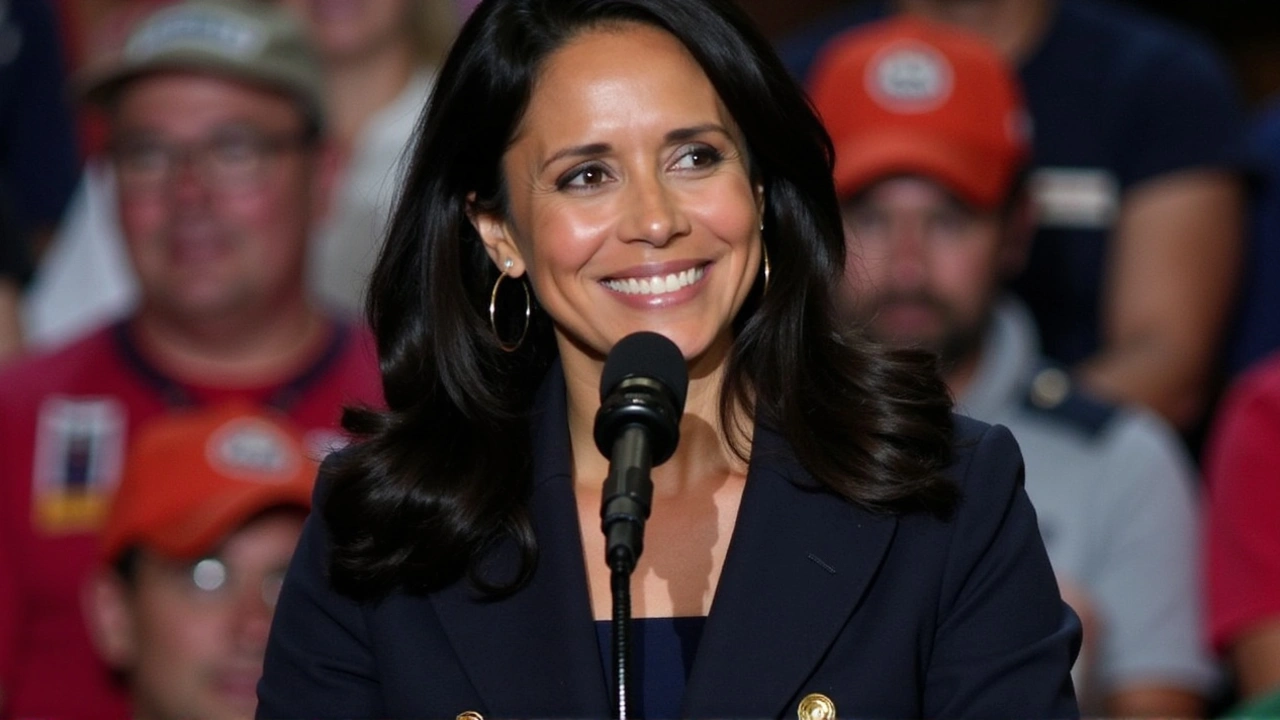Tulsi Gabbard: A Surprising Pick for Director of National Intelligence
In a move that has generated considerable discussion and speculation, President-elect Donald Trump has announced his choice of Tulsi Gabbard as the next Director of National Intelligence. Gabbard, who has a storied background as a veteran of the United States Army National Guard, stands out as a surprising selection for the position. Her appointment marks a significant departure from traditional picks for the role, traditionally filled by individuals with extensive backgrounds in intelligence operations.
Gabbard, 43, brings to the table a wealth of military experience, having served in the Army National Guard for over two decades. Her service includes deployments to conflict zones in Iraq and Kuwait, where she distinguished herself by earning a Combat Medical Badge in 2005. This honor was awarded for her participation in combat operations under hostile fire, showcasing her bravery and commitment to her country. However, despite these impressive credentials, Gabbard's lack of direct intelligence experience is noteworthy, especially considering her predecessors who mostly hailed from senior government intelligence roles.
A Controversial Political Transformation and Trump's Trust
Gabbard's political journey is as unconventional as her nomination. Originally a Democratic Representative for Hawaii in the U.S. House from 2013 to 2021, Gabbard ran for president in the Democratic primaries in 2020. Her bid, however, did not gain substantial traction, leading to her eventual departure from the Democratic Party in 2022. Earlier this year, she endorsed Trump, a move that significantly boosted her popularity among his supporters. In his announcement, Trump praised Gabbard, citing her bipartisan appeal and fearless approach, crucial qualities as he envisions an overhaul of the intelligence services.
Trump has repeatedly voiced his skepticism and distrust toward what he refers to as the 'deep state' within America's intelligence community. His selection of Gabbard is perceived as a bold step towards reshaping the Office of the Director of National Intelligence (ODNI), an entity established post-9/11 to enhance interagency cooperation. Under Gabbard's potential leadership, it remains to be seen how the intelligence services will adapt to this new vision. Her appointment is anticipated to undergo rigorous examination during the Senate confirmation process due to her novel approach and scant intelligence background.
The Future of America's Intelligence Community
Gabbard's appointment comes at a crucial time, with the ODNI playing a pivotal role in safeguarding national security against threats such as foreign interference in the democratic process. Her perspective, deviating from conventional norms, could imply new strategies and initiatives in addressing these challenges. Many supporters believe her distinct standpoint as a veteran and outsider could bring fresh insights and vigor, necessary for an organization that continually adapts to evolving global threats.
As Gabbard steps into the national spotlight, her every move will be keenly observed by policymakers, intelligence professionals, and the general public. The Senate confirmation hearings will undoubtedly explore her views on intelligence reform and her approach to tackling misinformation and other pressing security issues. Her administration, if confirmed, will reflect her unique fusion of military discipline, political experience, and newfound alliances.
Political Ramifications and Gabbard's Endorsement of Trump
Some political analysts suggest that Gabbard's endorsement of Trump was a strategic alliance, aligning her with a leader who values outsider perspectives in his administration. This bond not only bolsters her appeal among Trump loyalists but also cements her status as a transformative figure capable of navigating polarizing political landscapes. However, questions linger about her ability to transcend her political past and embrace a role traditionally shaped by intelligence careerists.
The nomination, amid Trump's desire to 'drain the swamp,' suggests a clear intention to challenge the status quo within the intelligence community. As the political scene continues to evolve, Gabbard's journey from a Democratic Congresswoman to a unifying figure in the Trump administration exemplifies the unpredictable nature of contemporary politics. Her path encourages a broader dialogue about the flexibility of political affiliations and the potential for cross-party alliances in restructuring governmental systems.

Conclusion
It is against this backdrop that Tulsi Gabbard embarks on her newest venture, one that will be scrutinized for its broader implications on national governance and international diplomacy. Her ability to bridge gaps between her military service and limited intelligence experience will be critical in leading one of the most important roles in the federal government. As she prepares for the challenges ahead, Gabbard’s appointment signals a dynamic period for American intelligence and the enduring transformative cycles within U.S. political arenas.

Rahul Sharma
November 15, 2024 AT 02:38Trump’s decision to hand the nation’s intelligence helm to a former congresswoman with a combat medical badge is a bold political maneuver, one that simultaneously shocks and intrigues analysts worldwide; the appointment bypasses the traditional pipeline of career intelligence professionals, raising questions about operational expertise versus political loyalty, especially in a climate where the intelligence community is often painted as the 'deep state' by the administration; Tulsi Gabbard’s two‑decade tenure in the Army National Guard, including deployments to Iraq and Kuwait, provides her with firsthand exposure to battlefield realities, yet it does not substitute for decades of experience in signal collection, covert operations, or analytic tradecraft; supporters argue that a fresh outsider perspective can dismantle entrenched bureaucratic inertia, injecting new strategic priorities such as counter‑disinformation and unconventional threat assessment; critics, however, caution that a lack of insider knowledge may lead to missteps in coordination with agencies like the CIA, NSA, and FBI, potentially compromising national security safeguards; the Senate confirmation hearings will likely scrutinize her stance on intelligence reform, her views on the role of technology in espionage, and her ability to command respect among seasoned operatives; historically, directors have risen from the ranks of the intelligence community, bringing nuanced understanding of classified sources and inter‑agency dynamics; breaking that tradition could either democratize oversight or erode institutional competence; moreover, Gabbard’s political journey-from a Democratic representative to a Trump ally-adds another layer of complexity, as partisan allegiances may color perceptions of her impartiality; nevertheless, her military decorations, such as the Combat Medical Badge earned under hostile fire, attest to personal courage and a willingness to serve under pressure; this personal valor could translate into decisive leadership in crisis scenarios, where swift judgment is paramount; still, the intelligence sphere demands not only bravery but also methodological rigor, legal acumen, and an appreciation for covert tradecraft; any misalignment between her leadership style and the operational tempo of the ODNI could create friction; observers note that Trump’s broader agenda to 'drain the swamp' often involves replacing career officials with loyalists, a strategy that has produced mixed results in past administrations; the potential benefits of injecting fresh energy must be weighed against the risks of politicizing intelligence assessments that inform foreign policy and national defense; in the end, the ultimate test will be whether Gabbard can bridge her battlefield experience with the analytic sophistication required to protect the United States from emerging threats; only time, and a rigorous confirmation process, will reveal if this unconventional appointment strengthens or weakens America’s intelligence posture; the debate continues, reflecting deep anxieties about the balance of expertise and loyalty in the highest echelons of national security.
Emily Kadanec
November 15, 2024 AT 22:05i think the pick is kinda wild but it might bring a new vibe.
william wijaya
November 16, 2024 AT 17:32From a strategic doctrine standpoint, inserting a non‑career intelligence operative at the apex of ODNI constitutes a disruptive variable; the operational tempo of clandestine networks relies heavily on continuity of tradecraft, and any deviation demands rapid adaptive mechanisms-otherwise, there is a risk of compromised SIGINT pipelines and fragmented HUMINT coordination, which could erode the latency thresholds essential for timely threat interdiction.
Lemuel Belleza
November 17, 2024 AT 12:58Looks like another political drama, nothing new.
faye ambit
November 18, 2024 AT 08:25The essence of leadership often lies beyond resume bullet points; it resides in the capacity to listen, to integrate diverse perspectives, and to foster a culture where expertise is valued over allegiance.
Subhash Choudhary
November 19, 2024 AT 03:52Honestly, it’s a wild move but maybe fresh eyes could shake things up a bit.
Ethan Smith
November 19, 2024 AT 23:18The appointment raises legitimate concerns about the balance between political loyalty and professional competence in the intelligence community.
Evelyn Monroig
November 20, 2024 AT 18:45All part of the deep state’s game-Trump knows the cabal’s eyes are everywhere, and this is a calculated strike to blind them.
Gerald Hornsby
November 21, 2024 AT 14:12What a twist! 🤔
Someone’s shaking the tree, and the birds are flying.
Hina Tiwari
November 22, 2024 AT 09:38I feel like this might be a chance for some real change, but it also feels risky, you know?
WILL WILLIAMS
November 23, 2024 AT 05:05Fresh perspective can spark innovation-let’s see how quickly the bureaucracy adapts.
Barry Hall
November 24, 2024 AT 00:32Interesting move. 😐
abi rama
November 24, 2024 AT 19:58Hopeful that new leadership can bridge gaps and boost collaboration across agencies.
Megan Riley
November 25, 2024 AT 15:25Great discussion-let’s keep analyzing the implications; every angle matters; this could reshape how intelligence works in the future!.
Lester Focke
November 26, 2024 AT 10:52One must consider the epistemological ramifications of appointing a figure whose credentials reside predominantly in combat medicine rather than cryptologic analysis; such a paradigm shift may, paradoxically, both invigorate and destabilize the intricate equilibrium of the intelligence apparatus.
Naveen Kumar Lokanatha
November 27, 2024 AT 06:18It will be interesting to see whether her background can bring new perspectives to data interpretation and threat assessment.
Alastair Moreton
November 28, 2024 AT 01:45Another case of political theatre; most likely, the real power remains hidden behind the curtains.
Surya Shrestha
November 28, 2024 AT 21:12Such an appointment undeniably challenges conventional norms; the ensuing discourse will be pivotal for democratic oversight.
Rahul kumar
November 29, 2024 AT 16:38Let’s hope the confirmation process digs deep and validates her capability to lead the intelligence community effectively.